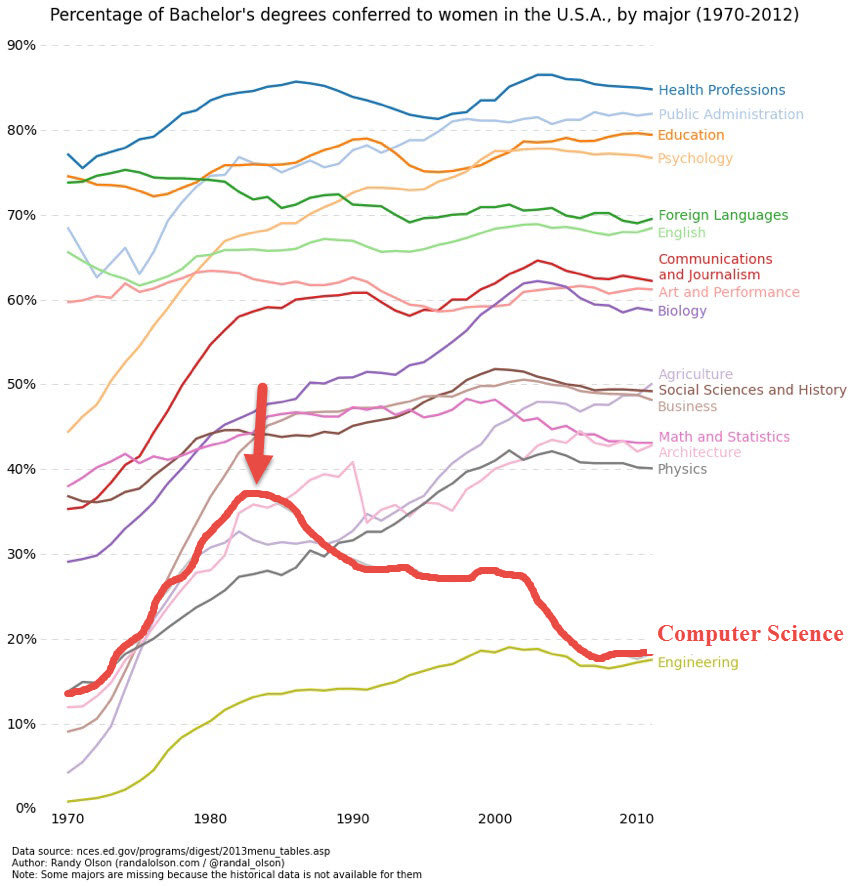By Warren Volkmann, Editor
HP Developers Portal
Editor's Note: HP has expanded International Women's Day (March 8) into an entire week of activities recognizing and celebrating the contributions of women. Here at the Developers' Portal, we are hosting a discussion about why the number of women in Computer Science has plunged over the past three decades. On this final day of HP's International Women's Week, we are please to feature a TED Talk by Reshma Saujani, founder of Girls Who Code.
In 2012 Reshma Saujani founded Girls Who Code. That year, her program trained 20 girls. In 2016 Girls Who Code will teach 40,000 girls in all 50 states. By 2020 she hopes to put 1,000,000 girls through her program.
In the process of teaching girls to code, Reshma discovered why girls weren't making it into computer science. She realized that girls were afraid of not being perfect.
Click to play Reshma's Feb. 2016 TED Talk.
Here are key passages from Reshma's 10-minute TED Talk, which was viewed almost a million times in the first two month:
 "Most girls are taught to avoid risk and failure. We're taught to smile pretty, play it safe, get all A's. Boys, on the other hand, are taught to play rough, swing high, crawl to the top of the monkey bars and then just jump off headfirst. And by the time they're adults, whether they're negotiating a raise or even asking someone out on a date, they're habituated to take risk after risk. They're rewarded for it. It's often said in Silicon Valley, no one even takes you seriously unless you've had two failed start-ups. In other words, we're raising our girls to be perfect, and we're raising our boys to be brave.
"Most girls are taught to avoid risk and failure. We're taught to smile pretty, play it safe, get all A's. Boys, on the other hand, are taught to play rough, swing high, crawl to the top of the monkey bars and then just jump off headfirst. And by the time they're adults, whether they're negotiating a raise or even asking someone out on a date, they're habituated to take risk after risk. They're rewarded for it. It's often said in Silicon Valley, no one even takes you seriously unless you've had two failed start-ups. In other words, we're raising our girls to be perfect, and we're raising our boys to be brave.
"Our economy, our society, we're just losing out because we're not raising our girls to be brave. The bravery deficit is why women are underrepresented in STEM, in C-suites, in boardrooms, in Congress, and pretty much everywhere you look.
"In the 1980s, psychologist Carol Dweck looked at how bright fifth graders handled an assignment that was too difficult for them. She found that bright girls were quick to give up. The higher the IQ, the more likely they were to give up. Bright boys, on the other hand, found the difficult material to be a challenge.They found it energizing. They were more likely to redouble their efforts.
"What's going on? Well, at the fifth grade level, girls routinely outperform boys in every subject, including math and science, so it's not a question of ability. The difference is in how boys and girls approach a challenge. And it doesn't just end in fifth grade. An HP report found that men will apply for a job if they meet only 60 percent of the qualifications, but women, women will apply only if they meet 100 percent of the qualifications. 100 percent. This study is usually invoked as evidence that, well, women need a little more confidence. But I think it's evidence that women have been socialized to aspire to perfection, and they're overly cautious.
"So in 2012, I started a company to teach girls to code, and what I found is that by teaching them to code I had socialized them to be brave. Coding, it's an endless process of trial and error, of trying to get the right command in the right place, with sometimes just a semicolon making the difference between success and failure. Code breaks and then it falls apart, and it often takes many, many tries until that magical moment when what you're trying to build comes to life. It requires perseverance. It requires imperfection.
"We immediately see in our program our girls' fear of not getting it right, of not being perfect. Every Girls Who Code teacher tells me the same story. During the first week, when the girls are learning how to code, a student will call her over and she'll say, "I don't know what code to write." The teacher will look at her screen, and she'll see a blank text editor. If she didn't know any better, she'd think that her student spent the past 20 minutes just staring at the screen. But if she presses undo a few times, she'll see that her student wrote code and then deleted it. She tried, she came close, but she didn't get it exactly right.Instead of showing the progress that she made, she'd rather show nothing at all. Perfection or bust."
"We have to begin to undo the socialization of perfection, but we've got to combine it with building a sisterhood that lets girls know that they are not alone. Because trying harder is not going to fix a broken system."
"For the American economy, for any economy to grow, to truly innovate, we cannot leave behind half our population. We have to socialize our girls to be comfortable with imperfection, and we've got to do it now. We cannot wait for them to learn how to be brave like I did when I was 33 years old. We have to teach them to be brave in schools and early in their careers, when it has the most potential to impact their lives and the lives of others, and we have to show them that they will be loved and accepted not for being perfect but for being courageous.And so I need each of you to tell every young woman you know -- your sister, your niece, your employee, your colleague -- to be comfortable with imperfection, because when we teach girls to be imperfect, and we help them leverage it, we will build a movement of young women who are brave and who will build a better world for themselves and for each and every one of us."
See for yourself the plunge in CS Majors:







